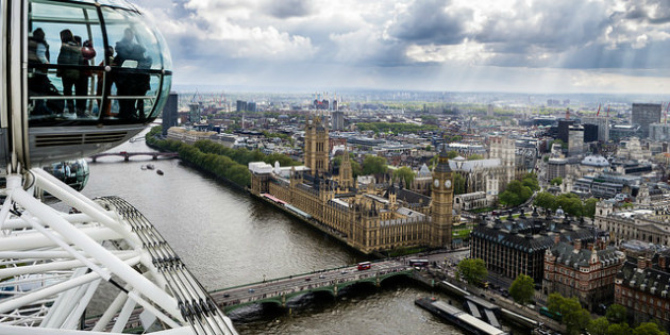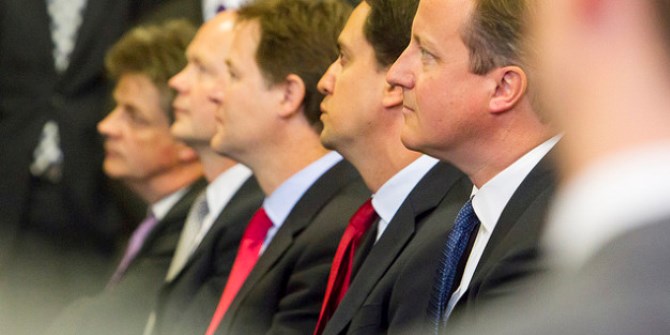 Rob Gandy discusses the possibility of the new parliament seeing an increase in ‘localism’ – more MPs representing a constituency in the region of their birth – and the implications of such a prospect for the UK’s political dynamics.
Rob Gandy discusses the possibility of the new parliament seeing an increase in ‘localism’ – more MPs representing a constituency in the region of their birth – and the implications of such a prospect for the UK’s political dynamics.
There can be little doubt that the current parliament has put strains on MPs in many ways and so it is not perhaps surprising that a good number of MPs have decided that they will not be standing again in the 2019 general election. Who they are varies between different sources, while there are also some MPs being dropped by their party and standing as an independent, or standing down from one seat to then stand in another.This serves to highlight the complexity and volatility of this general election. Nevertheless, the total number standing down is similar to that for many previous general elections.
Given this situation I replicated my analyses from the 2017 general election to establish whether these MPs leaving parliament might point to there being a further increase in ‘localism’ – in the sense of the MP representing a constituency in the region of their birth. This is pertinent because older MPs, who are more likely to be retiring, are generally less ‘local’ than younger MPs.
Whilst the number of MPs standing down who crossed more than one regional boundary (and were therefore not ‘local’) is the same as those representing constituencies in their region of birth (and were therefore deemed ‘local’), the former is a higher proportion of that category of MP (16.5%) compared to the latter (9%). Interestingly, 13.6% of MPs who represent constituencies in the region neighbouring that of their birth are also standing down.
At the 2017 general election, 316 (49%) of the MPs elected were ‘local’. But depending on how many of the MPs standing down are replaced by ‘local’ MPs, this figure could increase to well over 50%.
What will such increased ‘localism’ mean for political dynamics in the UK, given that English regions will probably be represented by increasing numbers of ‘local’ MPs? The Labour Party has always had a greater percentage of its MPs representing constituencies in their region of birth than the Conservatives – 54% compared to 37% in 2017. However, perhaps a symptom of the realisation that regionalism is an increasing issue is reflected in the announcement by Shadow Chancellor John McDonnell that he wants to transfer power and money out of the south-east of England, setting up a Treasury unit in the north of England. Is Labour concerned that it looks as though it is dominated by London MPs?
An analysis of the current Shadow Front Bench of the Labour Party shows high-level representation from London (Jeremy Corbyn, John McDonnell, Diane Abbott, Emily Thornberry, and Sir Keir Starmer all represent London constituencies). As is well-known, London voted for Remain in the EU Referendum, compared to the predominantly Leave North and Midlands. The latter is accepted as the key battleground in the forthcoming general election with the Conservatives targeting many Labour seats; these regions provided nearly two-thirds of Labour’s MPs in the 2017 general election. Therefore, to what degree can Labour rely on voters from its provincial heartlands continuing to vote for it when historically, expenditure has favoured Scotland and Wales through the Barnett formula, and London always seems to get by far the biggest slice of the English cake, despite Labour being in power for 13 years from 1997?
You have to go all the way back to Harold Wilson for the last leader of the Labour Party who was a native of, and represented a constituency in the English provinces. Since then, (ignoring acting leaders during times when a leadership process was taking place) there have been eight leaders, all with a link to one of London, Scotland and Wales. No doubt the London-centricity of the current Labour Party will raise its head as an issue in the forthcoming general election. This could lead to a shift in its internal dynamics after the election, whatever the result, because if there are big losses of seats in the North and Midlands, then the London-based leaders will be blamed by provincial members; and if Labour wins the election, then there are likely to be more born-and-bred Northern and Midland MPs who will demand change.
Notwithstanding these Labour Party issues, many current MPs who will be standing in the general election will not get enough votes to be re-elected. But given the anticipated volatility of voting, the above analysis suggests that an increase in ‘local’ MPs might be the one certainty to come from the election. What then might be the influence on national politics? Only time will tell.
________________
 Rob Gandy is a Visiting Professor at Liverpool Business School, Liverpool John Moores University, with many publications involving mobility in public services and their users.
Rob Gandy is a Visiting Professor at Liverpool Business School, Liverpool John Moores University, with many publications involving mobility in public services and their users.
All articles posted on this blog give the views of the author(s), and not the position of LSE British Politics and Policy, nor of the London School of Economics and Political Science. Featured image credit: Pixabay/Public Domain.








